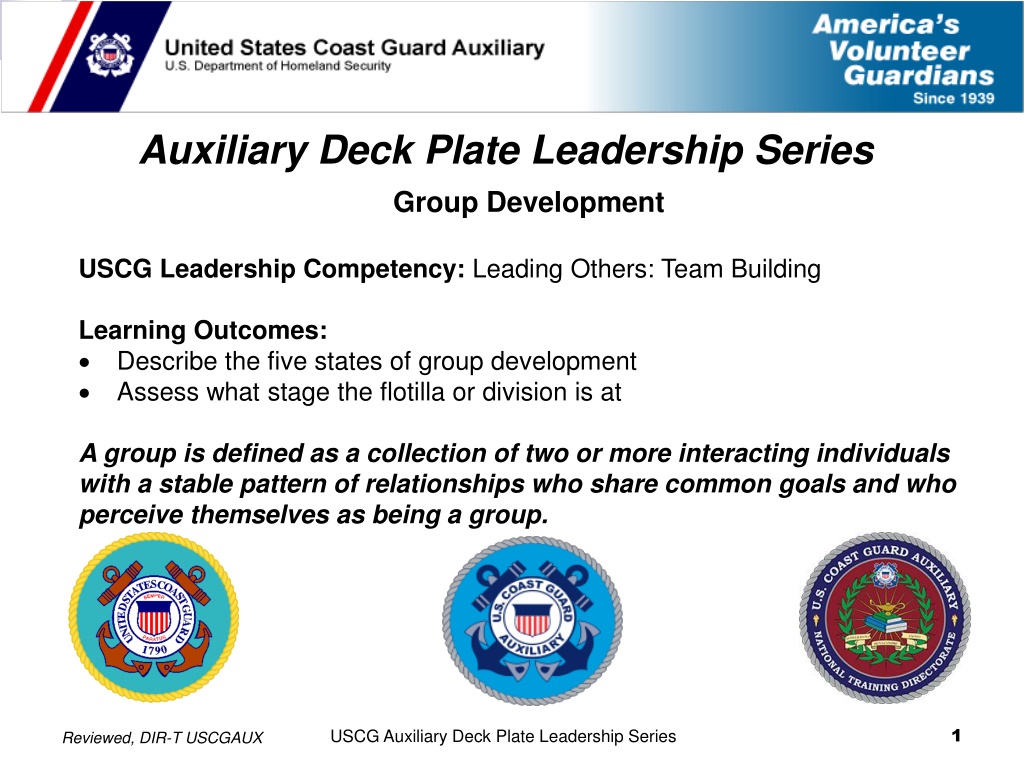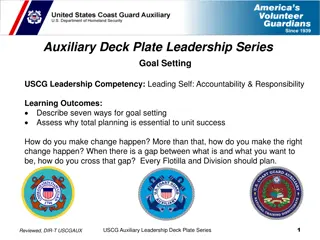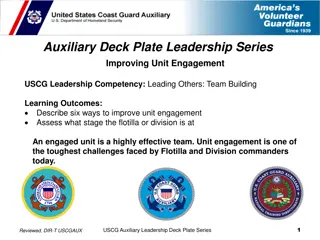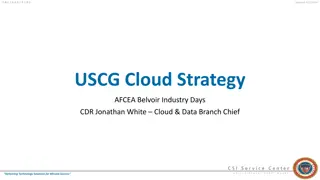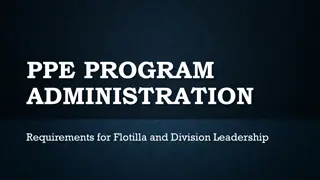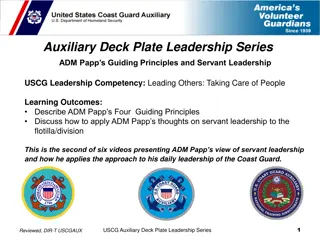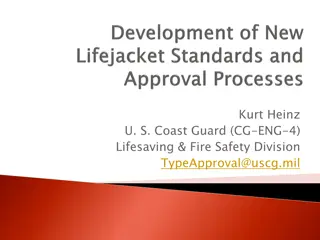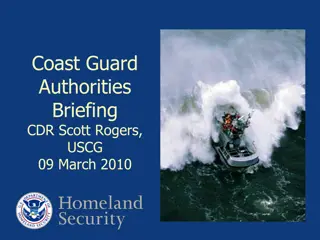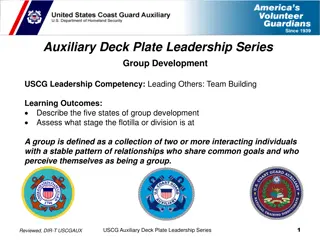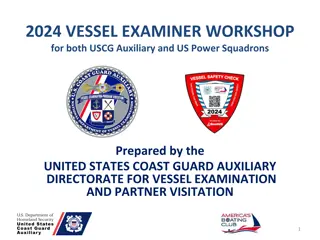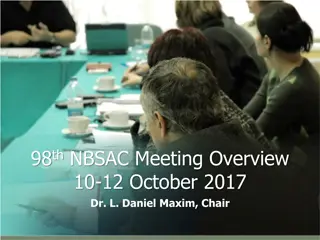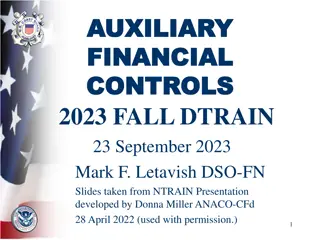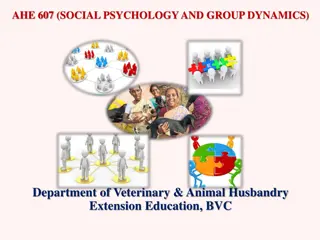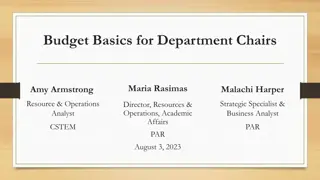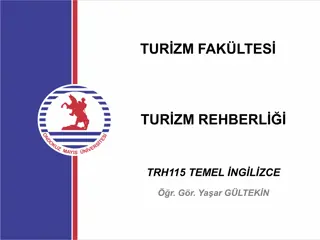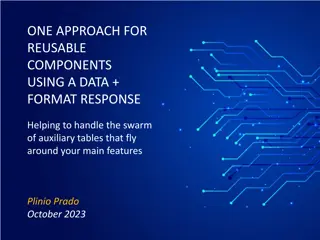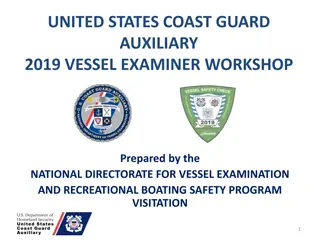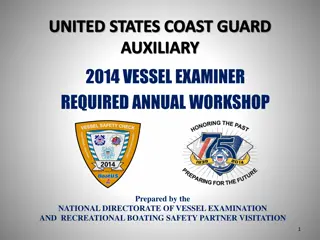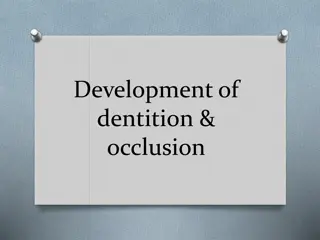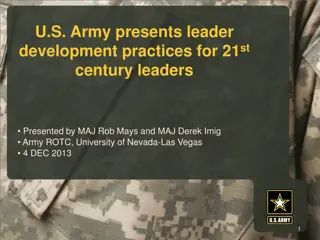Understanding Group Development Stages in USCG Auxiliary Leadership
Explore the five stages of group development - Forming, Storming, Norming, Performing, and Adjourning - in the context of the USCG Auxiliary leadership series. Assess the current stage of the flotilla or division based on behaviors and characteristics exhibited by members. From initial caution and confusion to the eventual accomplishment of tasks, each stage signals progress and challenges within the group dynamic.
Download Presentation

Please find below an Image/Link to download the presentation.
The content on the website is provided AS IS for your information and personal use only. It may not be sold, licensed, or shared on other websites without obtaining consent from the author. Download presentation by click this link. If you encounter any issues during the download, it is possible that the publisher has removed the file from their server.
E N D
Presentation Transcript
Auxiliary Deck Plate Leadership Series Group Development USCG Leadership Competency: Leading Others: Team Building Learning Outcomes: Describe the five states of group development Assess what stage the flotilla or division is at A group is defined as a collection of two or more interacting individuals with a stable pattern of relationships who share common goals and who perceive themselves as being a group. 1 USCG Auxiliary Deck Plate Leadership Series Reviewed, DIR-T USCGAUX
Definitions A group is two or more interacting individuals with a stable pattern of relationship who share common goals and who perceive themselves as being a group. Ex. Flotilla or Division Formal groups are defined by organizational structure: Command groups or Task groups (boat crew) Informal groups are groups that form to respond to common interests or social interaction: Interest groups or Friendship groups 2 USCG Auxiliary Deck Plate Leadership Series Reviewed, DIR-T USCGAUX
Why do people join volunteer organizations? Security Status Self-esteem Power Goal achievement Cultural identity Photo retrieved from http://www.cgaux.org/ 3 USCG Auxiliary Deck Plate Leadership Series Reviewed, DIR-T USCGAUX
Group Development Stages Forming caution, confusion, uncertainty. Storming tension, hostility, and intragroup conflict. Norming group norms and developing of close relationships. Performing - focusing on the accomplishment of the task. Adjourning getting closure. 4 USCG Auxiliary Leadership Deck Plate Series Reviewed, DIR-T USCGAUX
Forming High dependence on Flotilla Commander for guidance and direction. Little agreement on Flotilla aims other than received from leader. Member roles and responsibilities are unclear. Leader must be prepared to answer lots of questions about the Flotillas purpose, objectives and external relationships. Leader directs. 5 USCG Auxiliary Deck Plate Leadership Series Reviewed, DIR-T USCGAUX
Storming Decisions don't come easily within Flotilla. Members vie for position as they attempt to establish themselves in relation to other members and the leader, who might receive challenges from members. There is some clarity of purpose but plenty of uncertainties persist. Cliques and factions have formed and there may be power struggles. Leader coaches. USCG Auxiliary Deck Plate Leadership Series 6 Reviewed, DIR-T USCGAUX
Norming The Flotilla is more strategically aware; the members know clearly why they are doing what they are doing. The members have a shared vision and is able to stand on its own feet. There is a focus on over-achieving. Disagreements occur but now they are resolved within the Flotilla positively, and necessary changes to processes and structure are made by the members. The members are able to work towards achieving the goal, and also to attend to relationship, style and process issues along the way. Members look after each other. The Flotilla receives delegated tasks and projects from the leader. Members might ask for assistance from the leader with personal and interpersonal development. Leader delegates and oversees. USCG Auxiliary Deck Plate Leadership Series 7
Performing Agreement and consensus largely forms among the members, who respond well to facilitation by leader. Roles and responsibilities are clear and accepted. Big decisions are made by member agreement. Smaller decisions may be delegated to individuals or small teams within Flotilla. Commitment and unity is strong. The Flotilla may engage in fun and social activities. There is general respect for the leader and some of leadership is more shared by the members. Leader facilitates and enables. USCG Auxiliary Deck Plate Leadership Series 8 Reviewed, DIR-T USCGAUX
Assessing Flotilla stage Stage changes with group membership Stage changes during times of high stress Stage changes with tasks/topics Can also be used with individuals USCG Auxiliary Deck Plate Leadership Series 9 Reviewed, DIR-T USCGAUX
